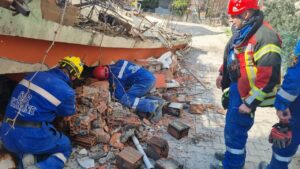How would Ayn Rand have responded to the Kahramanmaras earthquake?
During her 77 years she experienced disaster in many forms. As a teenager she lived through the Russian revolution, which destroyed her family’s prosperity and saw them leaving St Petersburg (as it was then and now is again) and fleeing to the Crimea. She achieved her dream of reaching the United States in 1926, in good time for the Wall Street crash of 1929 and the start of the Great Depression. She spent much of the Second World War in California, although she only began her second period of residence there in 1943, so she missed out on the when many there believed a Japanese attack on the West Coast was imminent. These were events ended the lives of millions before their time, and even the post-war period, while one of actual calm, was made uneasy by the Cold War, with its threat of atomic destruction. All these disasters were man-made, but Rand was still (just) living in Los Angeles at the time of the Long Beach earthquake, which killed some 120 people in 1933. In 1971 California was shaken again, when the San Fernando earthquake killed around 60 people. Although she was living in New York by then, she knew earthquakes happened. Did she have anything to say about them?

Ukrainian rescue team in Hatay, February, 2023. Despite the deliberate destruction being inflicted on their own country, they still went to the aid of strangers in another..
Source: Wikimedia Commons. File from the website of the State Emergency Service of Ukraine
It seems that she did, at least as one item in a category. In The Virtue of Selfishness she wrote about emergencies
An emergency is an unchosen, unexpected event, limited in time, that creates conditions under which human survival is impossible—such as a flood, an earthquake, a fire, a shipwreck. In an emergency situation, men’s primary goal is to combat the disaster, escape the danger and restore normal conditions (to reach dry land, to put out the fire, etc.).
By “normal” conditions I mean metaphysically normal, normal in the nature of things, and appropriate to human existence. Men can live on land, but not in water or in a raging fire. Since men are not omnipotent, it is metaphysically possible for unforeseeable disasters to strike them, in which case their only task is to return to those conditions under which their lives can continue. By its nature, an emergency situation is temporary; if it were to last, men would perish.
It is only in emergency situations that one should volunteer to help strangers, if it is in one’s power. For instance, a man who values human life and is caught in a shipwreck, should help to save his fellow passengers (though not at the expense of his own life). But this does not mean that after they all reach shore, he should devote his efforts to saving his fellow passengers from poverty, ignorance, neurosis or whatever other troubles they might have. Nor does it mean that he should spend his life sailing the seven seas in search of shipwreck victims to save . . . .
The principle that one should help men in an emergency cannot be extended to regard all human suffering as an emergency and to turn the misfortune of some into a first mortgage on the lives of others.
Here Rand is vividly demonstrating her extreme detachment from the real world. Extreme events are not only ‘metaphysically’ possible, but actually so. She is also hedging her bets. Evidently, she feels that in order to be taken seriously, she needs to at least acknowledge some elements of common humanity, but she raises more questions than she answers. At what exact point does an emergency cease to be an emergency? If shipwrecked sailors end up on a desert island, and are there for days, weeks or months, still in peril of their lives, does that continue the emergency? Or does the ‘Lord of the Flies’ scenario begin with the arrival on the beach? If food is in short supply, as would be all too likely, does her ‘philosophy’ license the strongest amongst the survivors to seize whatever they want, even if that means some of the weaker ones perishes? One feels that Rand herself, if there, would be amongst the first to go, or be eaten, having little useful to offer in such a situation.
Perhaps such an outcome would be just as well. If she survived she could return to a world in which she might see the aftermath of the February 6, 2023, or similar, event on a television or, as she would probably prefer, a cinema screen. There she would have seen human altruism, the thing she hated most, in its purest form. She would have seen ordinary people risking their own lives in attempts to save the lives of others, a thing specifically forbidden in the excerpt reproduced above. And doing so for no reward other than the possible joy of seeing a fellow human being emerge alive from a collapsed building seemingly destined to be their tomb. These are actions a million miles away from the self-regarding world of John Galt, or the self-justified piracy of Ragnar Danneskjold, who would presumably have been busy attacking and looting any ships carrying aid to the disaster zone; In Atlas Shrugged he is described as doing exactly that, in plundering ships carrying aid to starving people in Europe – and as being proud of it.
As, one must assume, Rand would be also.
